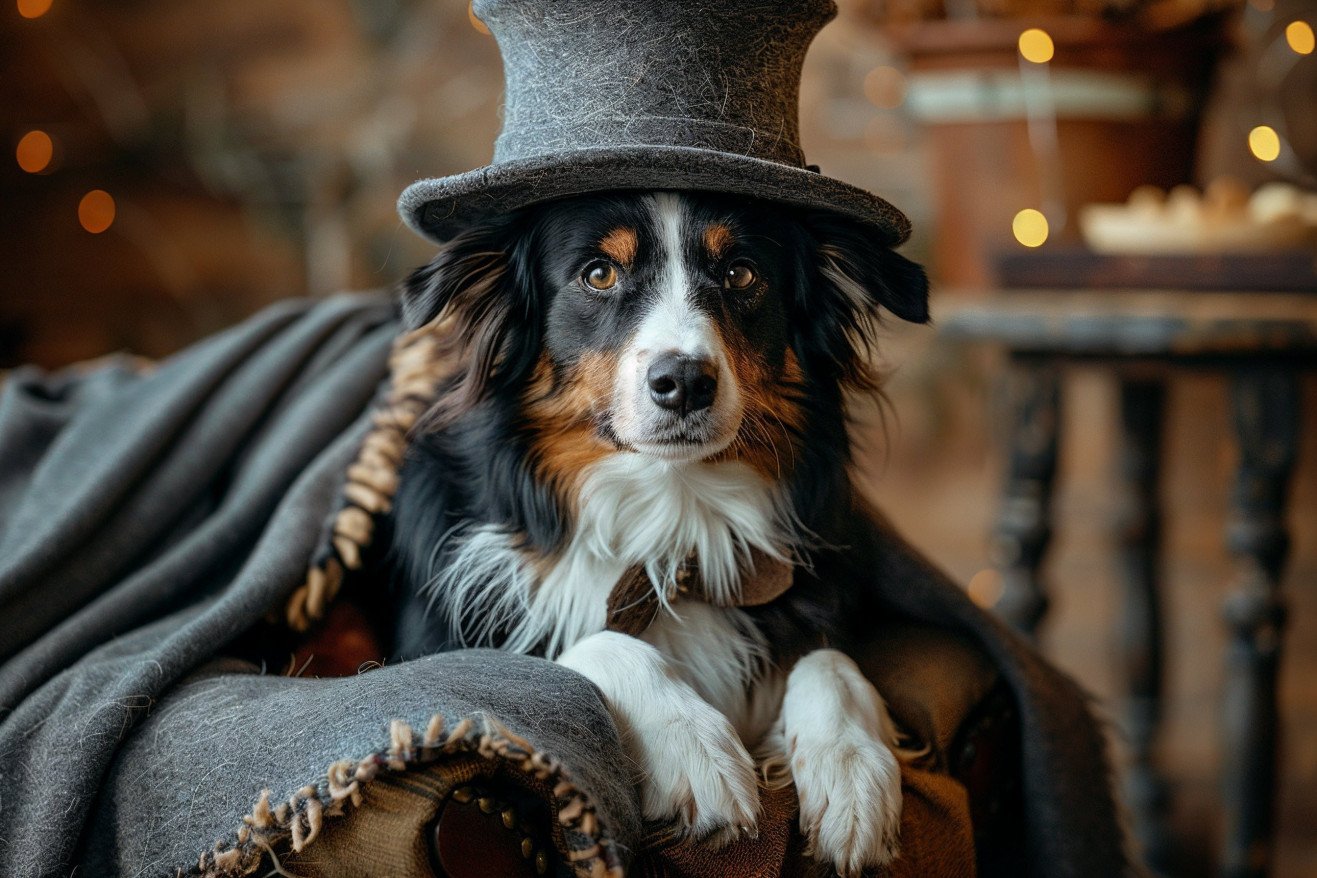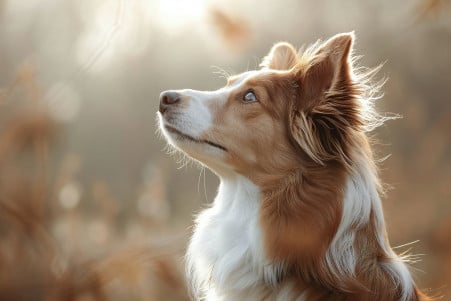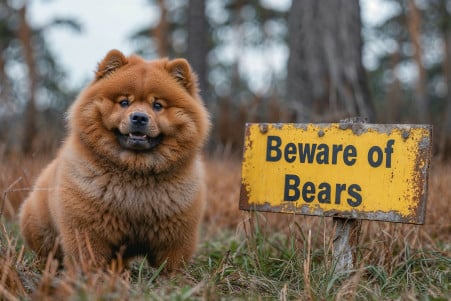What Is a Dog That Does Magic Called? Introducing the Mythical Barkadabra Hounds
21 March 2024 • Updated 19 March 2024

Do you want to know the best name for a dog that has magical powers, why people love dogs that do magic, and some fun things that dogs that do magic can do? Dogs that do magic are often referred to as "Barkadabra Hounds," a play on the word "abracadabra" (the classic magic word) and the sound of a dog barking. These intelligent dogs that seem to defy the laws of physics have been wowing audiences for generations with their amazing magic tricks and hilarious comedy acts.
In this exploration of these magical mischief-makers of the animal kingdom, we'll delve into historical records that reveal the fanciful history of Barkadabra Hounds, scientific studies that explain the psychology of why magic is such a popular form of entertainment, and funny personal stories that recount some of the most amazing magic tricks ever performed by dogs. From making tennis balls disappear to identifying playing cards selected by their human companions, Barkadabra Hounds have talents that will amaze and astound you.
What do you call a dog that can do magic?
Mythological Origins: Dogs in Myth and Legend Around the World
Dogs have appeared in many mythological and folklore traditions around the world, often serving as protectors, companions, or supernatural symbols. In Greek mythology, the monstrous three-headed hound Cerberus guarded the gates of the underworld for Hades. Meanwhile, the Norse Garmr was the watchdog of the entrance to Hel, the land of the dead. Anubis, the jackal-headed god of ancient Egypt, was a central figure in the mummification and afterlife process.
Celtic mythology featured the loyal hound Gelert, who sacrificed himself to save a prince's infant son, and the sinister Black Shuck, a death omen in English folklore. In Mexican mythology, Chihuahuas were thought to be spirit guides. These stories from around the world show that dogs have been and continue to be an important part of human culture, whether they are guarding the gates of the afterlife, protecting their human companions, or warning of danger.
The magical nature of these mythological dogs speaks to the human fascination with the special powers of our canine companions. Whether they are leading the dead to the afterlife or sensing danger before it happens, these myths and legends suggest that dogs have powers that go beyond human understanding. Their portrayal as supernatural creatures is a sign of the deep bond between humans and dogs that has existed for thousands of years. This diverse collection of myths and legends about dogs sets the stage for an exploration of how their magical nature has been depicted in modern fiction...
Fictional Furry Wizards: Canine Magicians in Books and Pop Culture
The idea of dogs with magical powers has captured the human imagination for centuries, and this has been reflected in a wide range of fictional literature. In J.R.R. Tolkien's Middle-earth legendarium, the Huan, the Hound of the Valar, was a giant dog with incredible tracking skills and the ability to talk. Meanwhile, Terry Pratchett's Discworld series introduced the scruffy mutt Gaspode the Wonder Dog, who learned to talk and think after years of eating scraps from the Unseen University's garbage.
Dogs with supernatural powers have also been popular in pop culture, including Krypto the Superdog, Superman's Kryptonian-powered pet, and the many versions of Dogmeat from the Fallout video game series. These fictional canines often have super senses, the ability to talk to humans, and even superpowers like the ability to fly and super strength. The continued popularity of these magical dogs shows that people are still fascinated by the idea that our four-legged friends can do things that go beyond the natural world.
As we've seen in our look at claims of psychic powers in dogs, the line between reality and fiction can sometimes get a little fuzzy, and it's tempting to wonder if the magical powers of these fictional dogs are based on real-life abilities.
Are There Real-Life Dog Psychics? The Science of Paranormal Canine Behavior
While the idea of dogs having psychic or supernatural powers may seem outlandish, there are many stories and even some evidence to suggest that some dogs may be more attuned to the paranormal than we realize. One of the most well-known examples is Jim the Wonder Dog, a dog from Missouri during the Great Depression that was said to be able to predict the outcomes of sports events and find specific objects.
From a scientific standpoint, scholars have suggested that dogs' enhanced senses could mean that they are detecting things that humans can't. According to The American Kennel Club, dogs have a "sixth sense" that allows them to pick up on changes in their environment through smell, sound, and even electromagnetic fields. This means that they could potentially be detecting disturbances or presences that we are unaware of.
On the other hand, Psychology Today has suggested that many of the experiences of dogs detecting ghosts, spirits, or other paranormal activity can be attributed to the way that dogs pick up on their owners' beliefs and emotions. If a person is open to the idea of the supernatural, their dog's cautious or fearful reactions to environmental stimuli can be interpreted as a response to a ghostly presence. The fact that this is still a topic of debate shows that there is no scientific consensus on whether dogs can detect the supernatural.
As research continues to delve into the unique relationship between people and their dogs, the idea that our canine companions have special senses that allow them to detect things that we can't continues to be an intriguing and unresolved question.
The Enduring Human-Canine Bond: Cultural and Psychological Significance
The human-canine bond has had a rich cultural and historical impact that has been felt by societies around the world. According to World History Encyclopedia, dogs have been worshiped as loyal friends, hunters, and protectors, and have even been considered spiritual beings. In ancient Mesopotamia, the goddess Inanna was accompanied by a group of hunting dogs, and the Egyptians mummified millions of dogs and puppies to give as offerings to the god Anubis, who had the head of a jackal.
The many roles that dogs have played throughout history, from the practical to the symbolic and spiritual, show that humans have always sought wonder, companionship, and a connection to the supernatural. As Sapiens notes, dogs' adaptability allowed them to be used in war, religious feasts, and as bed warmers, all of which show the deep psychological impact they had on ancient people.
In many societies, people believed that specific dogs had supernatural powers, including the ability to see the future or heal the sick. According to Mimi Matthews, Welsh corgis were once considered "fairy steeds" that had been given to people by the fairies, and pugs were thought to have the ability to draw out sickness. These beliefs show how much people have always wanted to live in a world where the supernatural and unexplained are real.
The stories of dogs with supernatural powers have been told in many times and places, showing how important and complex the human-canine bond has always been. As we learn more about this ancient bond, the idea of the supernatural dog continues to be just as compelling.
Conclusion: The Long-Lasting Magic of Dogs
From the guardians of the underworld in ancient Greece to the fairy steeds of medieval Wales, the stories of magical dogs have captured the human imagination for thousands of years.
The enduring appeal of these myths and legends can be attributed to a number of factors, including the human need for wonder, the desire for companionship, and the search for spiritual connection. However, the fact that these stories have persisted for so long and in so many different forms also suggests that they tap into something deeper and more universal in the human psyche.
As we have seen, the myths and legends of magical dogs are as diverse as they are numerous, but they all share one thing in common: they reflect and reinforce the importance of the bond between humans and dogs. This bond has been shaped by thousands of years of co-evolution and has been a source of comfort, protection, and inspiration for countless generations.
The myths and legends of magical dogs have helped people make sense of this bond, and in doing so, they have also helped to make it stronger. By imagining dogs as guardians, protectors, and even supernatural beings, people have been able to deepen their connection to their canine companions and to the natural world as a whole.
From the earliest days of human history to the present day, the myths and legends of magical dogs have helped people to understand and appreciate the unique relationship between humans and canines. In the process, they have also helped to ensure that this relationship remains as strong and as meaningful as ever.


